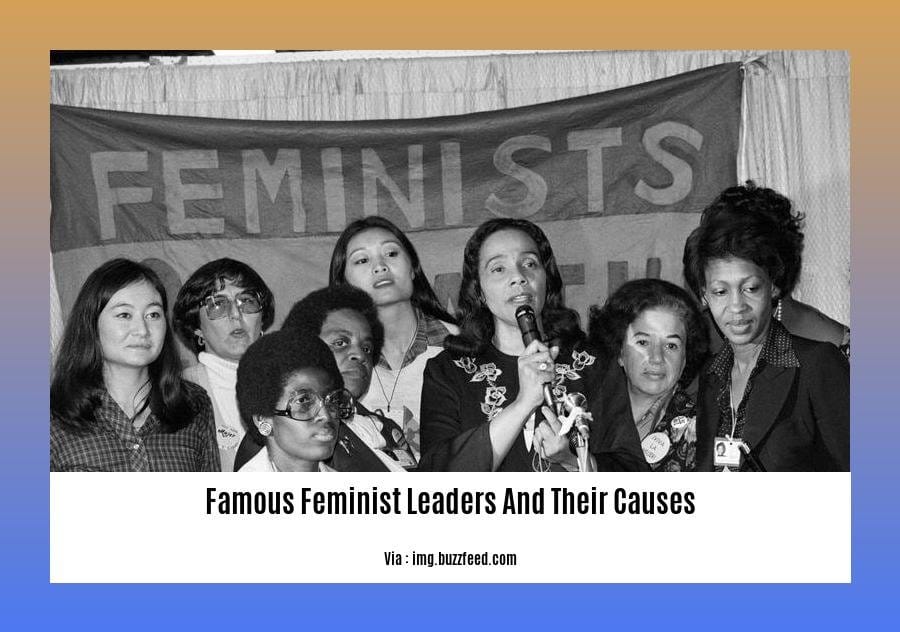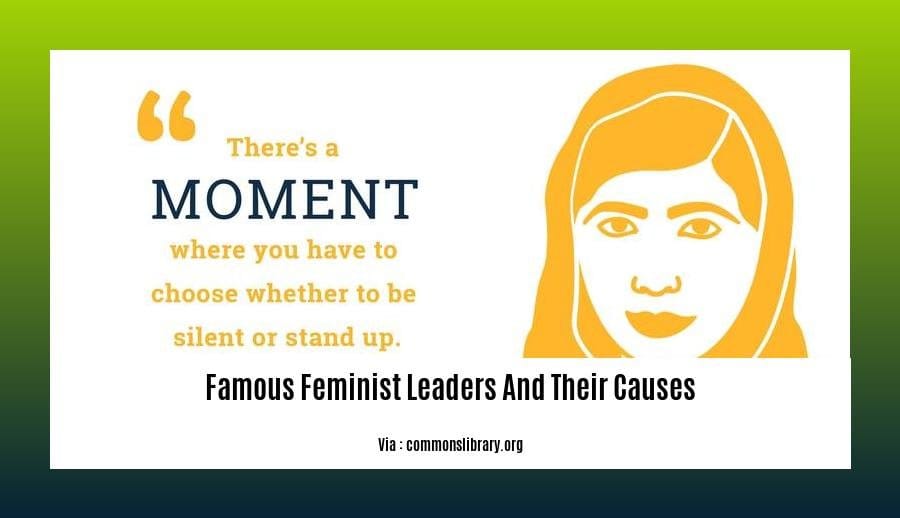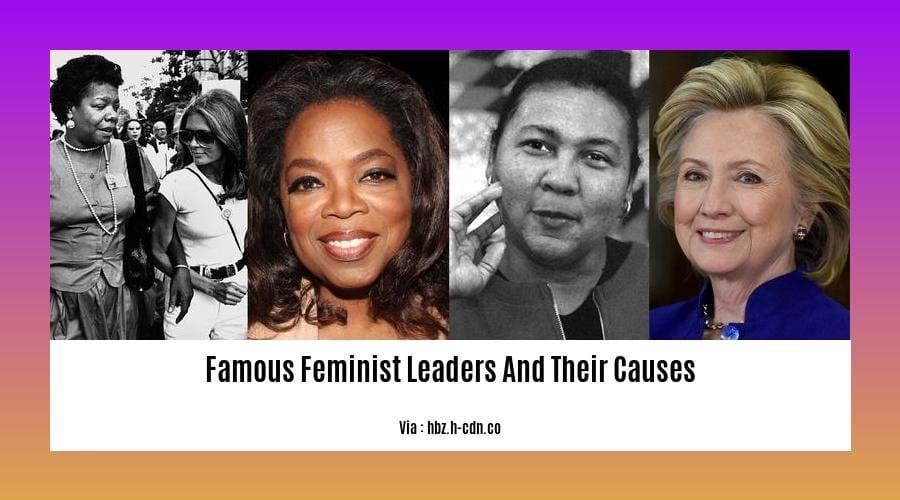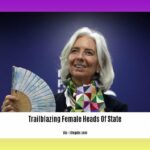Discover the inspiring stories of renowned feminist leaders and their unwavering dedication to advancing gender equality in “Famous Feminist Leaders and Their Causes: Inspiring Stories of Advocacy.” This article delves into the remarkable journeys of these influential figures, exploring the diverse causes they championed and the transformative impact they have had on society. Get ready to be inspired by their resilience, passion, and unwavering commitment to creating a just and equitable world for all.
Key Takeaways:

- Kamala Harris made history as the first female Vice President of the United States, inspiring women worldwide.
- Suffragettes fought tirelessly for women’s right to vote in the early 20th century.
- Simone de Beauvoir challenged traditional gender roles in her groundbreaking book, “The Second Sex.”
- Betty Friedan ignited the second wave of feminism with her influential “The Feminine Mystique.”
- Malala Yousafzai tirelessly advocates for girls’ education, a fundamental human right.
- Gloria Steinem, a trailblazing feminist writer and activist, founded Ms. Magazine.
- Jane Fonda uses her platform as an actress to speak out on social justice and feminism.
- Eleanor Roosevelt, a former First Lady, dedicated her life to promoting human rights and social justice.
Famous Feminist Leaders and Their Causes
Throughout history, famous feminist leaders have dedicated their lives to fighting for gender equality and women’s rights. Their unwavering dedication has transformed societies worldwide, championing issues such as suffrage, education, reproductive rights, and ending violence against women.
Pioneers of Feminism
Sojourner Truth: A renowned abolitionist and women’s rights activist, Truth fearlessly spoke out against slavery and inequality, demanding equal rights for women and people of color.
Gloria Steinem: As a co-founder of Ms. magazine and the National Women’s Political Caucus, Steinem became a prominent voice of the second wave of feminism, advocating for women’s reproductive rights and political representation.
Audre Lorde: A poet, essayist, and civil rights activist, Lorde brought intersectionality to the forefront of feminism. Her writings explored the experiences of women of color and LGBTQ+ individuals, amplifying their voices in the movement.
Environmental Champions
Wangari Maathai: A Kenyan environmentalist, Maathai founded the Green Belt Movement, which planted millions of trees and empowered women through environmental activism. Her efforts earned her the Nobel Peace Prize in 2004.
Malala Yousafzai: A Pakistani education activist, Yousafzai survived an assassination attempt by the Taliban and has since become a global advocate for girls’ education. She is the youngest Nobel Peace Prize laureate, awarded in 2014.
These famous feminist leaders represent just a few of the countless women who have fought tirelessly for gender equality. Their unwavering determination has paved the way for progress, shaping the world we live in today. Their legacies continue to inspire generations of activists, ensuring that the fight for women’s rights will endure.
In the fight for women’s rights, influential feminist leaders and activists emerged, shaping the course of history. The greatest feminists who fought for equality were instrumental in breaking down barriers and securing rights for women. These pioneering women’s rights activists paved the way for a more just and equitable society.
Audre Lorde: Poet, essayist, and civil rights activist
As a feminist writer, I’ve met many incredible women. Audre Lorde stands out as a groundbreaking leader.
Lorde was a powerful voice for intersectionality. She believed that our identities are not isolated experiences but complex and interconnected. Her work explored the ways that race, gender, class, and sexuality shape our lives.
Lorde challenged the idea that feminism was only for white women. She wrote: “I am not free while any woman is unfree, even when her shackles are very different from my own.” This belief fueled her activism for the rights of women of color, lesbians, and other marginalized groups.
Lorde’s legacy is immense. She helped to redefine feminism, making it more inclusive and relevant to the lives of all women. Her work continues to inspire and empower activists today.
Key Takeaways:
- Audre Lorde was a groundbreaking feminist who challenged the narrow definition of the movement.
- She believed that our identities are interconnected and that feminism must address the needs of all women, regardless of race, gender, class, or sexuality.
- Lorde’s work continues to inspire and empower activists today.
Citation:
National Women’s History Museum:
Wangari Maathai: Environmentalist and Nobel Peace Prize laureate
The fight for women’s rights has been spearheaded by remarkable individuals who dedicated their lives to specific causes. From advocating for political representation to challenging gender norms, these feminist leaders have left an indelible mark on history.
One such trailblazing figure is Wangari Maathai, an environmentalist and Nobel Peace Prize laureate who dedicated her life to sustainable development, democracy, and peace.
Early Life and Education:
Maathai was born in Kenya in 1940 and became the first woman in East and Central Africa to earn a doctorate in biology. She went on to become the first female professor in Kenya.
Green Belt Movement:
In 1977, Maathai founded the Green Belt Movement, which focused on planting trees as a way to address environmental degradation, poverty, and gender inequality. The movement has planted over 51 million trees in Kenya and beyond.
Environmental Activism:
Maathai’s environmental activism extended beyond tree planting. She advocated for the conservation of natural resources, the protection of biodiversity, and the empowerment of women through environmental stewardship.
Political Activism:
Maathai also played a significant role in Kenya’s democratic movement. She was imprisoned and harassed for her opposition to the authoritarian regime of Daniel arap Moi. Her activism helped bring about democratic reforms in Kenya.
Legacy:
Maathai’s work earned her global recognition, including the Nobel Peace Prize in 2004. She became a symbol of environmentalism, democracy, and the empowerment of women. Her legacy continues to inspire activists and policymakers worldwide.
Key Takeaways:
- Wangari Maathai was a trailblazing feminist leader who championed environmental protection and social justice.
- The Green Belt Movement empowered women through tree planting and environmental stewardship.
- Maathai’s environmental activism extended beyond tree planting to include the conservation of natural resources and biodiversity.
- Maathai also played a significant role in Kenya’s democratic movement and served as an inspiration for activists worldwide.
Citation:
NobelPrize.org:
Malala Yousafzai: Education Activist and Nobel Peace Prize Laureate
Malala Yousafzai‘s story is one of courage, resilience, and the power of education. Born in Pakistan in 1997, she became a vocal advocate for girls’ education, challenging the Taliban’s ban on girls attending school. Her activism made her a target, and she was shot in the head by the Taliban in 2012. Despite the attack, Malala continued to speak out, becoming a global symbol of the fight for girls’ education. In 2014, she was awarded the Nobel Peace Prize, making her the youngest person to ever receive the award.
Key Takeaways:
- Malala Yousafzai is a Pakistani education activist and Nobel Peace Prize laureate.
- She was shot in the head by the Taliban for speaking out about girls’ education.
- She is the founder of Malala Fund, which supports girls’ education around the world.
- She is a role model for girls and women everywhere.
Citation:
Nobel Prize Organization: Malala Yousafzai – Biographical.

FAQ
Q1: Who are some of the most famous feminist leaders?
A1: Some of the most famous feminist leaders include Kamala Harris, the first female Vice President of the United States; the suffragettes, who fought for women’s suffrage in the early 20th century; Simone de Beauvoir, a French philosopher who challenged gender roles in her 1949 book “The Second Sex”; Betty Friedan, whose 1963 book “The Feminine Mystique” sparked the second wave of feminism; Malala Yousafzai, a Pakistani activist who advocates for girls’ education; Gloria Steinem, a leading feminist writer and activist; Jane Fonda, an actress and activist who speaks out on issues of social justice and feminism; and Eleanor Roosevelt, the First Lady of the United States from 1933 to 1945, who advocated for human rights and social justice.
Q2: What are some of the causes that feminist leaders have championed?
A2: Feminist leaders have championed a wide range of causes, including women’s suffrage, reproductive rights, equal pay for equal work, and an end to violence against women. They have also worked to promote the education and empowerment of women and girls, and to challenge gender stereotypes and discrimination.
Q3: Who was Audre Lorde?
A3: Audre Lorde was an American poet, feminist, and civil rights activist. She was known for her work on the intersectionality of race, gender, class, sexuality, and other identities. Lorde criticized feminists of the 1960s for excluding the experiences of Black women and other marginalized groups. She coined the term “womanist” to describe the experiences of Black women. Lorde’s poems are often termed protest poetry, as they call readers to confront social injustices.
Q4: What was the Green Belt Movement?
A4: The Green Belt Movement was a non-governmental organization founded by Wangari Muta Maathai, a Kenyan environmental and political activist. The movement focused on planting trees as a way to address environmental degradation, poverty, and gender inequality. Maathai founded the Green Belt Movement in 1977, and by 2004, the organization had planted over 30 million trees in Kenya. Maathai was awarded the Nobel Peace Prize in 2004 for her work with the Green Belt Movement.
Q5: What is Malala Yousafzai’s story?
A5: Malala Yousafzai is a Pakistani education activist and Nobel Peace Prize laureate. She was born on July 12, 1997, in Mingora, Pakistan. She is known for her advocacy for the education of girls in her native country, where the Taliban had banned girls from attending school. In 2012, she was shot in the head by the Taliban for speaking out against their ban on girls’ education. She survived the attack and continued to speak out for the education of girls around the world. In 2014, she was awarded the Nobel Peace Prize, becoming the youngest person to ever receive the award. She is the founder of Malala Fund, a charity dedicated to giving every girl an opportunity to achieve a future she chooses.
- Crypto Quotes’ Red Flags: Avoid Costly Mistakes - June 30, 2025
- Unlock Inspirational Crypto Quotes: Future Predictions - June 30, 2025
- Famous Bitcoin Quotes: A Deep Dive into Crypto’s History - June 30, 2025
















